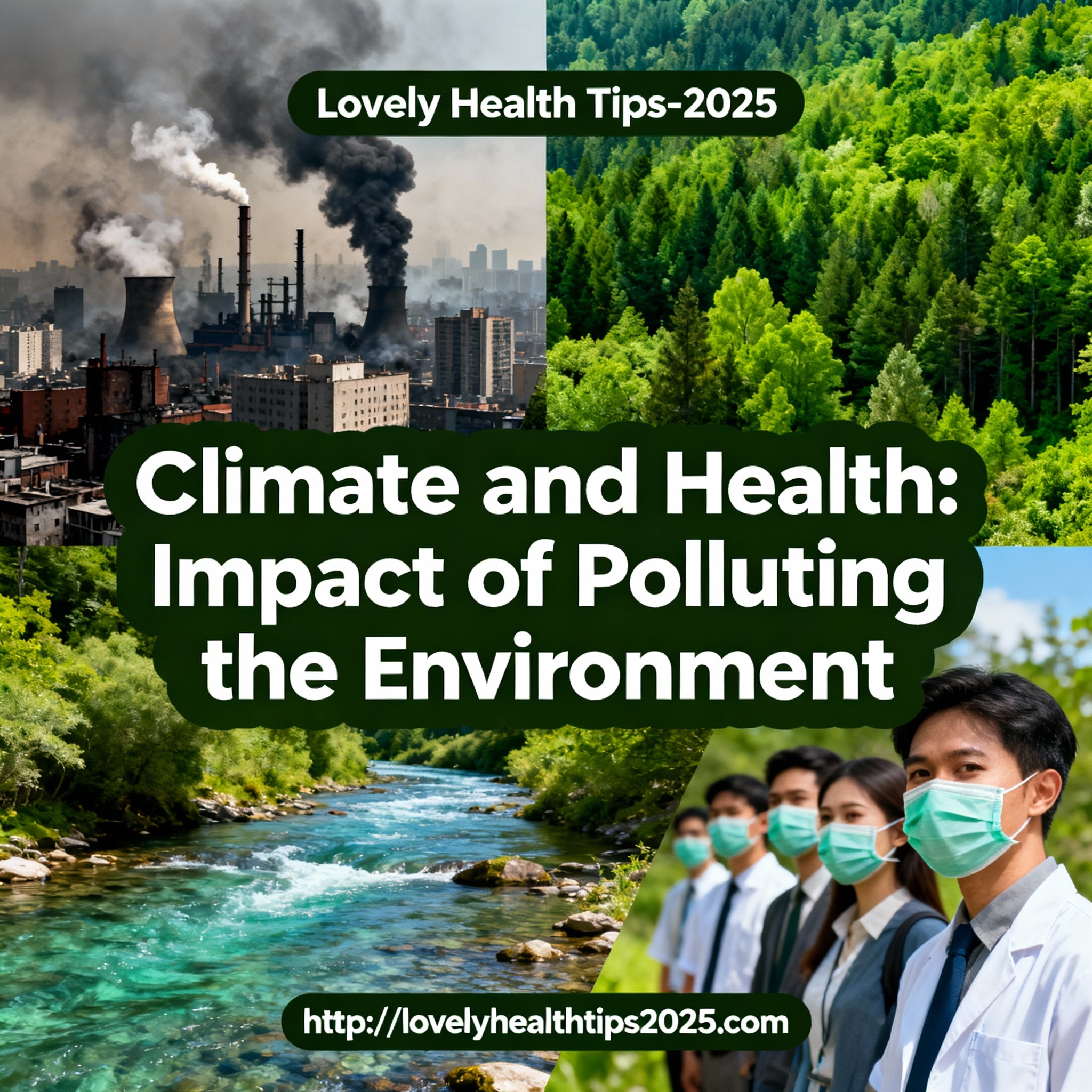Last Updated on November 15, 2025 by Lovely Health Tips-2025
The Direct connection between a polluted planet and human health : Polluting the Environment
Introduction to Climate & Health:
As we can see, we have never witnessed the relationship between the environment and our health the way that we do today. The rapid urbanization and industrialization, caused by climate change, is altering the way of life of the population and more importantly, the way our organism adapts to these changes. Such things as air pollutions, too much heat waves and environmental decline are not environmental problems, but rather violent expressive health problems.
The climate crisis shows a direct effect on human wellbeing from amplified respiratory disease to fatalities related to heat. I have tried to put forth the effects of pollution, heat waves including environmental change on the physical & mental health.
Pollution and Human Health
A. Air Pollution
One of the health environmental risks is air pollution. The World Health Organization (WHO) reported that nine out of every 10 individuals on earth are inhaling air that is contaminated in excess of feasible levels. The products of the emissions, i.e. the major pollutants are the key emissions, namely particulate matter (PM 2.5 and PM 10), nitrogen dioxide (NO2), ozone (O 3), and sulfur dioxide (SO 2).
- Cardiovascular Problem: Fine particles enter into the lungs which may cause the asthma, chronic obstructive pulmonary disease (COPD), lung cancer and heart diseases etc.
- Many children may also be vulnerable due to immature lungs & higher breathing rate. Study shows that, due to long exposure to pollution, Children are having problem in slow growth of lungs, infection in respiration which are leading to increase the absenteeism in school.
- Neurological side-effects due to air pollution : May include cognitive deterioration of children, Alzheimer disease & also developmental delay in children.
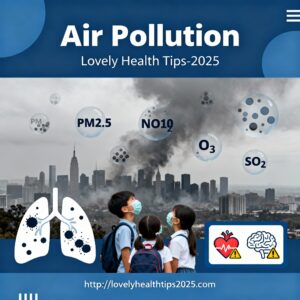
B. Water Pollution
Contaminated water, industrial effluent, farming runoff and poor handling of waste products etc. impact millions of human beings on earth. Water pollution leads to diarrhea, cholera, typhoid or other alimentary issues. In the countryside, there have been incidences of skeletal fluorosis to cancer after being exposed to poisonous arsenic and fluoride contamination in their ground water.
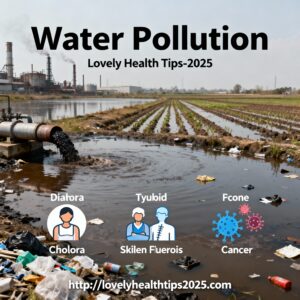
C. Soil Pollution
The chemicals and heavy metals present in food crops and the soil (mostly pesticides byproducts, mining and industrial wastes) cause bioaccumulation of toxins in individuals. These pollutants can lead to injuries even to the nervous system, kidney system and even cancer.
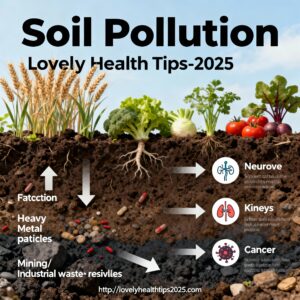
2. Human body vrs heat waves:
Rising Temperatures:
- Global warming has also worsened heat waves and their intensity. Urban cities due to heat island effect, they experience a rise in temperature than in the surrounding rural regions. Heat waves are being occasional incidences and are currently seasonal occurrences.
- Effects of Heat: If excessive heat over longer duration, it may imbalance the temperature of body which may leads to dehydration, heat exhaustion & may be heatstroke.
- Cardiac Problem: It may also increase the threat of heart attack & stroke. Effects of Stress, irritability and even aggression are augmented, subsequently on Mental Health. Research has been done which indicates that the anxiety and depression escalate even in the long durations of conditions of heat.
- More Deaths: Children, individuals with chronic illnesses, youth and the elderly are most susceptible populations. An example is the Europe heatwave of 2003 that claimed the lives of over 70,000 people.
Indirect Impacts:
- Air quality is now deteriorating because of hot weather which is also indirectly causing the respiratory illness of human.
- Food Security: The foreigners affect the foreign food system
& it is the degradation effect of the unreasonable heat that reduces the manufacturing of foodstuffs and the reproduction of animals, in terms of nutrition security. - Cases of occupational hazards: Construction and agriculture, outside work and a long term health complications, a loss of productivity, dehydration etc.
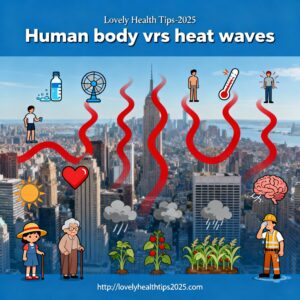
3. Environmental & Health Change.
A. Extreme Weather Events
- Floods: Cholera and leptospirosis are water borne diseases. The effects of each of these events on the health of the majority have a long-term impact:
- Droughts: Starvation due to absence of food & die of thirst due to absence of water.
- Wildfires: Long term lungs damage as well as acute ventilatory & cardiovascular disturbances are caused by smoking.
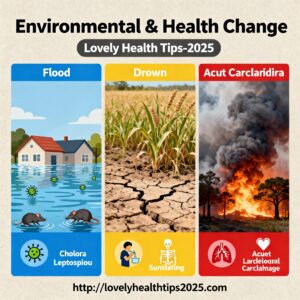
B. Vector-Borne Diseases
Global warming increases the regions that harbor disease carrying vectors like mosquitoes and ticks. Dengue diseases, malaria, chikungunya and Lyme diseases are already spotted where they were no such occurrence seen previously.
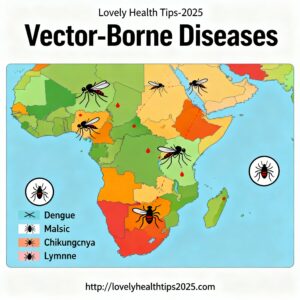
C. Mental Health & Eco-Anxiety
The eco-anxiety trend is emerging because of climate insecurity and environmental devastation. Individuals and especially the youths are said to have feelings of hopelessness and fear and anxiety towards the future of this earth. Post-traumatic stress disorder (PTSD), depression and enduring psychological trauma are additional disorders among the victims of Climate Disasters.
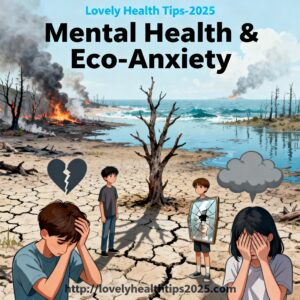
4. Vulnerable Populations:
Communities in general are not equally impacted by pollution, heat waves and environmental change.
- Infants & Children: There is a chance of increasing the Respiratory & diarrhea disease in infants & children.
- Low-income Communities: They may be inhabitants of a high-pollution area, occupy poor houses and may not be able to afford quality healthcare services.
- Outdoor Workers: constantly at risk of being overheated due to bad air quality.
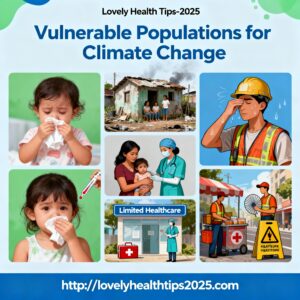
5. Transforming the World into a Global Village:
5.1 Policy and Governance
- Sterner Pollution -Governments need to establish pollution regulations, introduce cleaner fuel supply and penalize violators.
- Plan for Heatwave Management: Many Cities may prepare a mechanism for an early warning system, cooling areas and also awareness campaigns among people.
- Urban area smart infrastructure: Construction of climate friendly smart Green urbanization through drainage and energy efficient constructions.
5.2 Community Initiatives
- Planting trees and gardens in the urban area: Better air quality, shade and reduce urban heat islands effects.
- Awareness Campaigns: The individuals should be sensitized, how to curb pollution, how to conserve garbage and energy.
- Local Health Camps: This will involve offering prevention related disease screenings and information on different prevention measures.
5.3 Individual Actions
- We must try to reduce the personal pollution like smoke from vehicles and bikes, reduce the utilization of plastic thus causing reduce the energy etc.
- Masks may be used during any high pollution area. Also during the heat wave, we should drink plenty of waters and other liquid food.
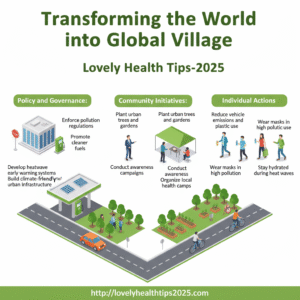
6. Future Outlook:
A better future may be depended upon the global health in the future & we should have an eye to reduce the Greenhouse gas emissions with addressing climate change. However, the climate crisis may led to a health crisis and it can be minimized with the assistance of proactive initiatives such as clean energy, long-term city planning, better healthcare facilities, and well-built communities.
We should also focus on investing fund in protection of the environment. So that, it may support human lives, decreasing the healthcare costs and helps to flourish in tomorrow’s generations.
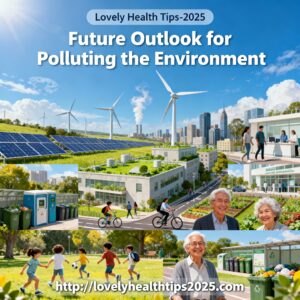
Concluding Points:
Human health is depended on the health of the environment. Pollution, global warming and global climatic changes are quietly creating our health conditions & in most cases, with catastrophic outcomes. Sound good governance by communities and individual people can result in a healthy and stronger society. A responsible attitude towards the environment is to not only save the climate, but also health.
Reference from my previous blog post on
- Outdoor wellness, Sunlight & Nature : Gift for human
- Anti-Inflammatory Foods – Lovely Health Tips-2025
A guide to daily foods that reduce inflammation, support immunity, and improve long-term health. - 7 Days Meal Plan for Better Nutrition – Lovely Health Tips-2025
A balanced weekly meal plan designed to boost energy, improve digestion, and support overall wellness. - Top 5 Anti-Aging Supplements – Lovely Health Tips-2025
A science-backed review of supplements that support skin health, longevity, and cellular repair. - 7 Natural Foods for Women’s Hormonal Balance – Lovely Health Tips-2025
Natural foods proven to help balance hormones, reduce PMS symptoms, and support reproductive health. - Early Childhood Development – Lovely Health Tips-2025
Covers major developmental milestones and activities that support a child’s early brain and physical growth.
Reference from other reliable source which may be read :
- Climate change, pollution and health — Impact of chemicals, waste and pollution on human health
- WHO – Climate Change and Health (Fact Sheet)
An overview of how climate change affects global health, including heat stress, diseases, and air quality. - PMC – Human Health Impacts of Climate Change
Peer-reviewed research on climate-related health risks such as respiratory diseases, vector-borne illnesses, and mortality. - United Nations – Causes & Effects of Climate Change
Explains the science behind climate change and its impact on ecosystems, weather patterns, and human life. - The Lancet – Climate Change & Global Public Health
A comprehensive scientific analysis of climate change as a major global health threat. - NASA – Effects of Climate Change
Detailed scientific explanations of rising temperatures, ice melt, sea-level rise, and extreme weather. - Earth.org – Biggest Environmental Problems of Our Time
Covers major environmental threats including pollution, deforestation, species loss, and climate change. - AAFP – Climate Change & Environmental Health Policy
Official policy statement highlighting the medical community’s response to climate-related health challenges. - WHO – Health Impacts of Air Quality & Energy
WHO review of how air pollution and energy systems affect respiratory, cardiovascular, and global health. - PMC – Climate Change & Public Health: Evidence Review
Scientific review discussing climate-related disease patterns, health vulnerabilities, and adaptation strategies.
FAQs:
Q1. How does climate change and human health relate to each other?
Ans. Another effect of climate change on health risks is that it exposes people to heatstroke, infectious diseases and malnutrition due to changes in weather patterns and the distribution of dangerous pollutants.
Q2. So what form of pollution is the worst?
Ans. The worst thing is air pollution, particularly, the fine particulate matter. It gets into the blood and it attacks the lungs, heart and the brain.
Q3. What is the impact of air pollution on the old and the children?
Ans. The children and elderly are more susceptible to unclean air. It has the potential to cause asthma, cough, chronic bronchitis and reduced lung performance in the long run.
Q4. Is it possible that pollution leads to mental illnesses?
Ans. Air pollution is associated with an increased stress level, anxiety, depression and cognitive deterioration in the long run.
Q5. What are the effects of climate change on the safety of food and water?
Ans. Higher temperatures and unpredictable precipitation pollute water, lower the quality of crops, and augment food-borne illnesses.
Q6. What leads to environmental pollution?
Ans. Key reasons are industrial emissions, vehicle emissions, deforestation and plastic waste as well as the combustion of fossil fuels.
Q7.What is that that people can do to limit pollution?
Ans. To reduce your environmental footprint, use public transport, recycle, use no plastics, preserve energy and plant trees.
Q8. What are the measures being implemented by governments to ensure that health is not polluted?
Ans. The governments are implementing clean air policies, fostering renewable energy, enhancing waste disposal and establishing healthcare infrastructure that is climate resistant.
Q9. Why should we conserve the environment and with relation to the future?
Ans. Environmental security guarantees a healthy environment with clean air, safe water and conducive environment in which future generations can survive.
Thanks and Regards.
About the Author – “Mr. Bibhu Ranjan Mund”, Master in Public Health (MPH) from IIHMR University, Jaipur (Rajasthan) has experience of 18 years in Public Health activities. Through “Lovely Health Tips-2025”, we share the evidence & experienced based health & wellness guides with solutions for every day well-being. More from Author
Disclaimer
This information is suggestive only and not a replacement for medical advice. For more detail, please visit to my website as mentioned below:

